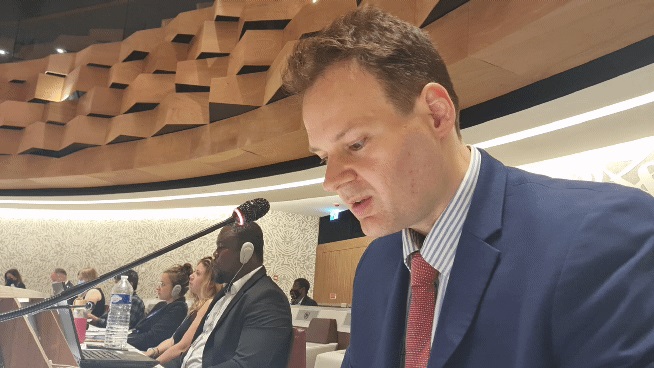Distinguished guests,
I wish to describe the situation of the Rehoboth Basters. The Rehoboth Basters are a community of approximately fifty-thousand people who mostly reside in their traditional lands in what is now central Namibia. They are the descendants of the First Indigenous Nations of Southern Africa, the Khoikhoi and San, and Europeans who migrated to Southern Africa in the 1600s.
At the Okahandja Peace Conference in September 1870 the Rehoboth Basters were officially recognised as the legitimate inhabitants of the region. They subsequently transformed their legal norms, which had governed their community for years, into a formal constitution for the Rehoboth Area. This constitution, named the Paternal Laws, was accepted in January of 1872 and continued to be in use by the community for over one hundred years.
In 1885, German colonial rule entered the territory when the Rehoboth Basters signed the Treaty of Protection and Friendship with the German Empire. This Treaty outlined the rights and freedoms of the Rehoboth Basters. German colonial rule lasted until 1915 when it was replaced by South African colonial rule, which lasted until 1989. During these times the Rehoboth Baster community continued to have a, declining, degree of limited self-governance based and inspired on the original 1885 Treaty.
In 1979, the South African colonial government formally set up an administrative division for the Rehoboth Area to which the traditional structures, symbols and land of the Rehoboth Basters were transferred. When the democratic State of Namibia gained its independence in 1990, the new government took control over all assets that had previously belonged to the colonial government. This included all the land, development projects and monuments that had been communally owned by the Rehoboth Basters for over a hundred years, but had been transferred to the new colonial administrative division in 1979. The Rehoboth Basters never received reparations or their land back and were left politically homeless, because they were never recognised as an indigenous people or traditional authority.
As mentioned in the EMRIP draft report in point 13 advice no. 15, treaties and agreements concluded by a colonial power should be honoured by successor States. Namibia however, wrongly equates the traditional rights and resources of the Rehoboth Basters as a product of colonialism, while in reality its source lies in the self-determination of an indigenous People that signed an agreement with a colonial power in the 19th century.
Furthermore, the EMRIP draft report in chapter V point 45 mentions that indigenous Peoples have sometimes been excluded from the negotiation table. The Rehoboth Basters are one of those excluded indigenous Peoples. Two recent examples are the following:
- The Namibian government held consultations with many community stakeholders about the future of the rights of indigenous Peoples, which led to the Draft White Paper on the Rights of Indigenous Peoples. However, the Rehoboth Basters were excluded from these consultations.
- The Rehoboth Basters are also ignored and excluded from the negotiations concerning the reconciliation efforts to recognise German colonial crimes in the area. A Reconciliation Agreement between Namibia and Germany was signed in May 2021, but it completely omits the numerous colonial crimes committed against the Rehoboth Basters.
As long as the Rehoboth Basters are on the menu, instead of at the table, their rights as an indigenous People will be ignored and the crimes of colonialism will endure.
Thank you,
Jeroen Zandberg
Expert Mechanism on the Rights of Indigenous Peoples, 15th session, Monday 4 July 2022,
Item 3 Study on Treaties, agreements and other constructive arrangements between indigenous peoples and States, including peace accords and reconciliation initiatives and their constitutional recognition.

